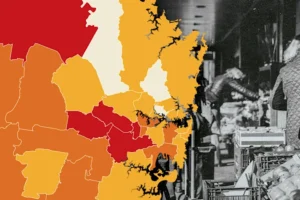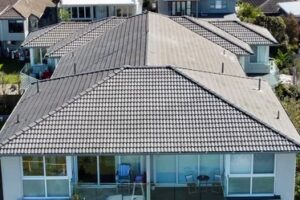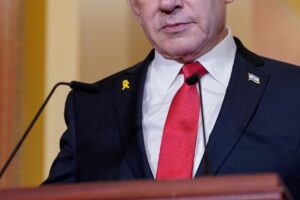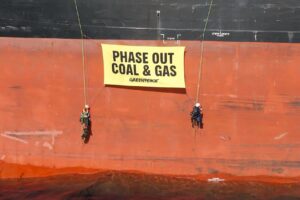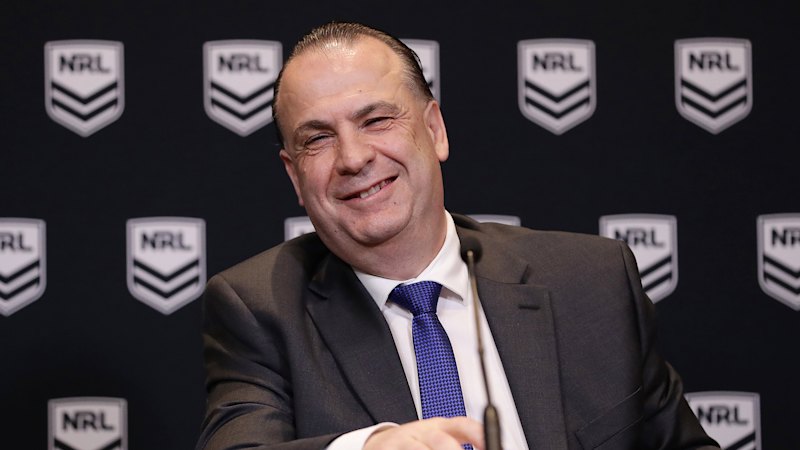
As are Seven, according to a recent report in The Australian, and he’s also sought a meeting with Ten’s new owner, David Ellison. This month, he warned Nine and Foxtel, via The Financial Review, he’d take the rights elsewhere if they collude, which has left countless executives scratching their heads as to where V’landys thinks he is going to go.
Ask almost anyone in media circles, and they’ll tell you the idea Seven has the cash is fanciful, as is the idea that the AFL and the NRL could be given equal prominence on one network.
And while Ten and Paramount have new billionaire owners, David Ellison is likely to be more focused on his efforts to buy Warner Bros, HBO and CNN than spending billions on rugby league. There’s also no sign any of the international giants are interested, though V’landys may try to split the rights between more than two partners, like the English Premier League or NFL.
Chances are you’re about to lose
Crucially, there is a requirement to keep games on free TV, and the sector is less cashed-up than when the AFL, Seven and Foxtel struck their record deal. At that time, the networks were on a post-COVID bounce.
Since then, hundreds of millions in ad dollars a year have evaporated, and one of the biggest financial bulwarks of modern sport – gambling money – is under threat.
New figures show wagering firms have cut their advertising spend by 36 per cent since 2022 – much more than other sectors – amid public backlash and looming regulations on the industry.
Total spend fell from $139.3 million across the first eight months of 2022 to $88.8 million this year, according to SMI Guideline figures shared with On Background, with successive declines in each year.
Crucially, ending in August, the figures cut off before the punting heavy AFL and NRL finals as well as spring racing.
V’landys knows better than any the power of online wagering companies. Racing NSW has flourished under his leadership, partly thanks to Sportsbet and Ladbrokes. The NRL and AFL both have big sponsorship deals with Sportsbet, receive fees for each bet placed on the sports, and television ads help pay for the ballooning cost of the rights.
The Albanese government is yet to formally respond to the 31 recommendations made by the Murphy Report 842 days ago, which urged heavy regulations on the industry, including a blanket ban on ads. The public supports it, but the leagues say the money underpins grassroots sport, the media companies say they can’t live without it, and the bookies say a ban will lead to illegal activity, to which the PM agrees.
“We’ve always preferred Aussie rules”: Rupert Murdoch announces Foxtel’s bumper deal with the AFL in 2015 after the NRL re-signed with Nine behind their back.Credit: Simon O’Dwyer
And still, millions are being spent splashing the logos of betting companies on team jerseys and in stadiums. And the betting industry is hoping that slowing down the deluge of ad dollars will help it stave off a full ban.
This is the first competitive rights process for the NRL since 2012, and a major test for networks that are contending with collapsing ad revenue and the prospect of limited gambling revenue. It is impossible to say at this point if V’landys will get his asking price. Since the AFL deal, Foxtel customers have borne the brunt of the cost, with successive Kayo price rises, and no more free-to-air matches on Saturdays.
Spotted: ‘Boris’ enters the belly of the beast
Tongues were wagging in Nine’s 1 Denison Street HQ on Tuesday when Sky News boss Paul Whittaker, or Boris, as he’s known, was spotted heading into the lifts.
It probably wasn’t to put a good word in for James Birtles, his deputy head of programs, who is rejoining Nine as EP of A Current Affair.
Sky News Australia CEO Paul Whittaker was in unfamiliar territory this week.Credit: Alex Ellinghausen
While there was speculation he could be discussing a bid for 3AW and 2GB, On Background is told it was more innocently the first face-to-face get-together with Nine CEO Matt Stanton, with Sky a long-term commercial partner for Nine’s news footage.
Free speech warriors
If Boris had picked up our call, we would’ve asked him why Sky appears to be reviewing its regular guest list following Bacongate. While regular After Dark programming was interrupted for the first of a three-part Tony Abbott documentary on Monday to coincide with his new book (published by News Corp’s HarperCollins, of course), viewers were denied an appearance from the network’s favourite history lecturer, Stephen Chavura of Campion College, for a second week running.
Loading
Chavura, whose “Anglo-Celtic” social media content was a focus after Freya Fires Up was axed two and a half weeks ago, won’t be returning to his weekly spot on The Bolt Report on Mondays, On Background is reliably told.
For what it’s worth, when contacted, Chavura said it is always a privilege to appear on Bolt and Sky, while Sky’s communications team didn’t even bother to write back.
The KIIS of death
This week, we saw the sixth (and second-last) radio ratings for the year. A year and a half into Kyle Sandilands and Jackie “O” Henderson’s Melbourne entry, it seems the pair have settled on a norm of around a six per cent audience share at breakfast.
Maybe executives at ARN are fine with this. But with the pair’s new $10 million per year contracts (each!), there is an implicit understanding that the cash represents the increased advertising dollars that come from a new market. Only, that’s the opposite of what’s happened.
ARN’s share of ad dollars spent in the five metro markets is down 12.4 per cent through the first seven months of the year, which has left it $7.5 million worse off compared to last year.
Now this is obviously not all down to the star duo, but breakfast traditionally sets up the day of programming, and since the launch, KIIS’ overall share in Melbourne has cratered, down to just 4.9 per cent.

